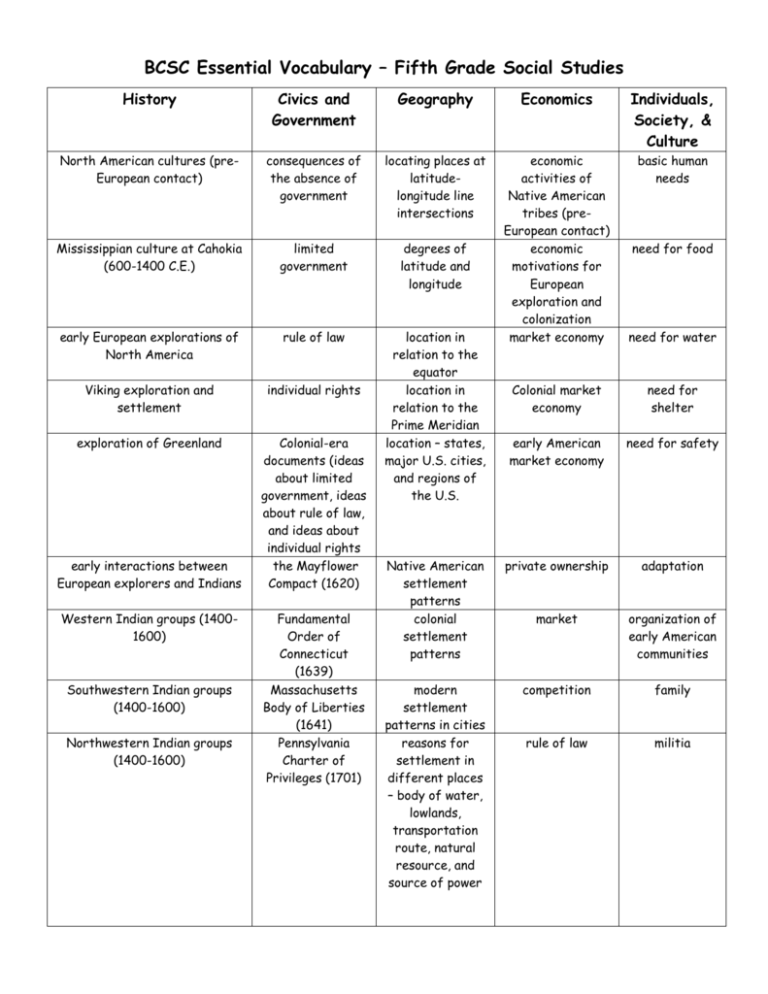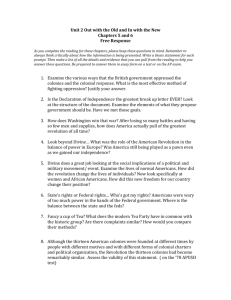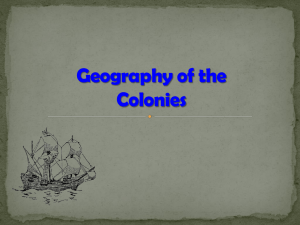BCSC Essential Vocabulary – Fifth Grade Social Studies
advertisement

BCSC Essential Vocabulary – Fifth Grade Social Studies History Civics and Government Geography Economics Individuals, Society, & Culture North American cultures (preEuropean contact) consequences of the absence of government locating places at latitudelongitude line intersections basic human needs Mississippian culture at Cahokia (600-1400 C.E.) limited government degrees of latitude and longitude early European explorations of North America rule of law need for water Viking exploration and settlement individual rights Colonial market economy need for shelter exploration of Greenland Colonial-era documents (ideas about limited government, ideas about rule of law, and ideas about individual rights the Mayflower Compact (1620) location in relation to the equator location in relation to the Prime Meridian location – states, major U.S. cities, and regions of the U.S. economic activities of Native American tribes (preEuropean contact) economic motivations for European exploration and colonization market economy early American market economy need for safety Native American settlement patterns colonial settlement patterns private ownership adaptation market organization of early American communities modern settlement patterns in cities reasons for settlement in different places – body of water, lowlands, transportation route, natural resource, and source of power competition family rule of law militia early interactions between European explorers and Indians Western Indian groups (14001600) Southwestern Indian groups (1400-1600) Northwestern Indian groups (1400-1600) Fundamental Order of Connecticut (1639) Massachusetts Body of Liberties (1641) Pennsylvania Charter of Privileges (1701) need for food History Civics and Government Geography Economics Individuals, Society, & Culture Arctic Indian group (1400-1600) development of representative self-government democratic practices in the British imperial political system town meeting Continental Divide consumer sovereignty colleges and universities drainage basins in the United States development of technology in the early United States impact of inventions on productivity in the early United States effect of education and training on productivity business group Sub-arctic Indian groups (14001600) Great Plains Indian groups (1400-1600) Eastern Woodlands Indian groups (1400-1600) colonial legislative body housing style charters on individual freedoms and rights Settlement pattern key ideas about government in founding documents key ideas in the – Declaration of Independence, Articles of Confederation, Northwest Ordinance, United States Constitution, and the Bill of Rights union Oral tradition Political organization Economic organization popular sovereignty climate regions (United States) influence of location on – Spanish colonies, French colonies, and British colonies Influence of natural environment on – Spanish colonies, French colonies, and British colonies changes in land use Native American land use Colonists’ land use manufacturing regions of colonial America colonial assembly early American conflicts effect of specialization on productivity founding of Providence, Rhode Island effect of investment of capital resources on productivity dominance of certain careers in different regions Loyalist Patriot conflict effect of specialization on interdependence effect of price changes on historical events Federalist Anti-Federalist conflict early American visual art early American crafts History Civics and Government Geography Economics Individuals, Society, & Culture land and water routes of North American explorers republican government (republicanism) constitutional government (constitutionalism) federal government (federalism) Preamble to the Constitution of the United States general welfare of society protection of individual right to liberty attainment of the common good individual rights in the Bill of Rights right of association (freedom of association) freedom of religion agriculture regions of colonial America changes in agriculture cotton prices early American music beaver pelt prices early American architecture changes in manufacturing gold prices early American literature historical map personal budget map elements spending decision map title saving decision Paul Revere silver work and furniture Phyllis Wheatley “Yankee Doodle” land and water routes of Caribbean explorers European explorers of North America European explorers of the Caribbean Christopher Columbus Hernan Cortes Hernando de Soto Francisco Vasquez de Coronado Jacques Cartier Samuel de Champlain map legend directional indicator map projection Native American life (early America) Henry Cabot right to vote European settler life (early America) Henry Hudson right to speak freely (freedom of speech) right to criticize the government right to own property human adaptation to the environment human changes to the environment influence of physical features on historical events John White early Spanish settlements regional folk tale regional narrative regional traditional arts effect of scientific innovation on early American life effect of technological innovation on early American life History Civics and Government Geography early French settlements types of elections influence of physical features on historical movements early English settlements St. Augustine Roanoke Island Quebec Santa Fe Jamestown primary election general election local election state election national election congressional election presidential election legislative branch of the U.S. government executive branch of the U.S. government judicial branch of the U.S. government relationships between branches of the U.S. government civic responsibility religious reason for European migration to the Americas political reason for European migration to the Americas economic reason for European migration to the Americas European migration (1607-1763) impact of European exploration on American Indians impact of European settlement on American Indians European-Indian agricultural exchange trade between American Indians and European settlers European-Indian cultural exchanges European-Indian military alliances broken treaties between Europeans and Indians massacres and land conflicts between Europeans and Indians King Philip’s War (1675-1676) French and Indian War civic disposition civility cooperation responsible participation ways to voice opinions ways to monitor government public agenda participation in the election process Economics Individuals, Society, & Culture History Civics and Government Thirteen colonies – political organization, social organization, and economic organization political leaders of colonial America civic responsibility religious leaders of colonial America John Smith William Bradford Roger Williams Anne Hutchinson John Winthrop Thomas Hooker William Penn slavery divisiveness of slavery issue between Northern and Southern colonies causes of the American Revolution colonial resistance to British imperial policies denial of the traditional rights of Englishmen to American colonists taxation without representation Stamp Act Townsend Acts taxes on tea Coercive Acts (Intolerable Acts) British leaders (1763-1783) American leaders (1763-1783) First Continental Congress Second Continental Congress Declaration of Independence (1776) Common Sense Revolutionary War battles King George III Benjamin Franklin issues involving – civic responsibility, individual rights, and the common good Geography Economics Individuals, Society, & Culture History Patrick Henry Thomas Jefferson John Adams Thomas Paine George Washington General Charles Cornwallis Franc’s influence on the American Revolution Spain’s influence on the American Revolution Russia’s influence on the American Revolution Germany’s influence on the American Revolution Poland’s influence on the American Revolution Netherland’s influence on the American Revolution Marquis de Lafayette Bernardo de Galvez Thaddeus Kosciusko Friedrich Wilhelm Von Steuben role of women in the American Revolution Abigail Adams Martha Washington Mercy Otis Warren Molly Pitcher consequences of the American Revolution drafting of state constitutions achievement of independence by the United States reasons for creation of the United State Constitution (1787) people involved in the Constitution’s development George Washington James Madison George Mason Alexander Hamilton origins of the Bill of Rights (1791) Civics and Government Geography Economics Individuals, Society, & Culture History drafting of the Bill of Rights (1791) development of the first American political parties Presidential election of 1792 Presidential election of 1796 Presidential election of 1800 time line (United States history 1776-1801) events of the American revolution the Boston Massacre the Battle of Lexington Green problems of the founding period of the United States Civics and Government Geography Economics Individuals, Society, & Culture








